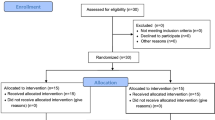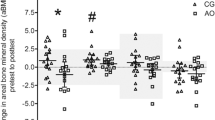Abstract
Increased inflammation and weight loss are associated with a reduction in bone mineral density (BMD). Aerobic exercise may minimize the loss of bone and weight loss may contribute to a decrease in cytokines. We tested the hypothesis that aerobic exercise in combination with a weight loss program would decrease circulating concentrations of inflammatory markers, thus mediating changes in BMD. This was a nonrandomized controlled trial. Eighty-six overweight and obese postmenopausal women (50–70 years of age; BMI, 25–40 kg/m2) participated in a weight loss (WL; n = 40) or weight loss plus walking (WL + AEX; n = 46) program. Outcome measures included BMD and bone mineral content of the femoral neck and lumbar spine measured by dual energy X-ray absorptiometry, interleukin-6, tumor necrosis factor-α, soluble receptors of IL-6, and TNF-α (sTNFR1 and sTNFR2; receptors in a subset of the population), VO2 max, fat mass, and lean mass. Weight decreased in the WL (p < 0.001) and WL + AEX (p < 0.001) groups. VO2 max increased (p < 0.001) after WL + AEX. There was a 2% increase in femoral neck BMD in the WL + AEX group (p = 0.001), which was significantly different from the WL group. The change in sTNFR1 was significantly associated with the change in femoral neck BMD (p < 0.05). The change in VO2 max was an independent predictor of the change in femoral neck BMD. Our findings suggest that the addition of aerobic exercise is recommended to decrease inflammation and increase BMD during weight loss in overweight postmenopausal women.



Similar content being viewed by others
References
Bacon L, Stern JS, Keim NL, Van Loan MD (2004) Low bone mass in premenopausal chronic dieting obese women. Eur J Clin Nutr 58(6):966–971
Reid IR (2002) Relationships among body mass, its components, and bone. Bone 31(5):547–555
Shapses SA, Riedt CS (2006) Bone, body weight, and weight reduction: what are the concerns? J Nutr 136(6):1453–1456
Flegal KM, Carroll MD, Ogden CL, Johnson CL (2002) Prevalence and trends in obesity among US adults, 1999–2000. JAMA 288(14):1723–1727
Riedt CS, Cifuentes M, Stahl T, Chowdhury HA, Schlussel Y, Shapses SA (2005) Overweight postmenopausal women lose bone with moderate weight reduction and 1 g/day calcium intake. J Bone Miner Res 20(3):455–463
Villareal DT, Fontana L, Weiss EP, Racette SB, Steger-May K, Schechtman KB, Klein S, Holloszy JO (2006) Bone mineral density response to caloric restriction-induced weight loss or exercise-induced weight loss: a randomized controlled trial. Arch Intern Med 166(22):2502–2510
Ricci TA, Heymsfield SB, Pierson RN Jr, Stahl T, Chowdhury HA, Shapses SA (2001) Moderate energy restriction increases bone resorption in obese postmenopausal women. Am J Clin Nutr 73(2):347–352
Ryan AS, Nicklas BJ, Dennis KE (1998) Aerobic exercise maintains regional bone mineral density during weight loss in postmenopausal women. J Appl Physiol 84(4):1305–1310
Chubak J, Ulrich CM, Tworoger SS, Sorensen B, Yasui Y, Irwin ML, Stanczyk FZ, Potter JD, McTiernan A (2006) Effect of exercise on bone mineral density and lean mass in postmenopausal women. Med Sci Sports Exerc 38(7):1236–1244
Fantuzzi G (2005) Adipose tissue, adipokines, and inflammation. J Allergy Clin Immunol 115(5):911–999; quiz 920
Gur A, Denli A, Nas K, Cevik R, Karakoc M, Sarac AJ, Erdogan F (2002) Possible pathogenetic role of new cytokines in postmenopausal osteoporosis and changes during calcitonin plus calcium therapy. Rheumatol Int 22(5):194–198
Koh JM, Khang YH, Jung CH, Bae S, Kim DJ, Chung YE, Kim GS (2005) Higher circulating hsCRP levels are associated with lower bone mineral density in healthy pre- and postmenopausal women: evidence for a link between systemic inflammation and osteoporosis. Osteoporos Int 16(10):1263–1271
Scheidt-Nave C, Bismar H, Leidig-Bruckner G, Woitge H, Seibel MJ, Ziegler R, Pfeilschifter J (2001) Serum interleukin 6 is a major predictor of bone loss in women specific to the first decade past menopause. J Clin Endocrinol Metab 86(5):2032–2042
Bismar H, Diel I, Ziegler R, Pfeilschifter J (1995) Increased cytokine secretion by human bone marrow cells after menopause or discontinuation of estrogen replacement. J Clin Endocrinol Metab 80(11):3351–3555
Weitzmann MN, Pacifici R (2006) Estrogen deficiency and bone loss: an inflammatory tale. J Clin Invest 116(5):1186–1194
Bastard JP, Jardel C, Bruckert E, Blondy P, Capeau J, Laville M, Vidal H, Hainque B (2000) Elevated levels of interleukin 6 are reduced in serum and subcutaneous adipose tissue of obese women after weight loss. J Clin Endocrinol Metab 85(9):3338–3342
You T, Berman DM, Ryan AS, Nicklas BJ (2004) Effects of hypocaloric diet and exercise training on inflammation and adipocyte lipolysis in obese postmenopausal women. J Clin Endocrinol Metab 89(4):1739–1746
Bruun JM, Pedersen SB, Kristensen K, Richelsen B (2002) Opposite regulation of interleukin-8 and tumor necrosis factor-alpha by weight loss. Obes Res 10(6):499–506
Marfella R, Esposito K, Siniscalchi M, Cacciapuoti F, Giugliano F, Labriola D, Ciotola M, Di Palo C, Misso L, Giugliano D (2004) Effect of weight loss on cardiac synchronization and proinflammatory cytokines in premenopausal obese women. Diabetes Care 27(1):47–52
Nicklas BJ, Rogus EM, Colman EG, Goldberg AP (1996) Visceral adiposity, increased adipocyte lipolysis, and metabolic dysfunction in obese postmenopausal women. Am J Physiol 270(1 Pt 1):E72–E78
WHO (1994) Assessment of fracture risk and its application to screening for postmenopausal osteoporosis. Report of a WHO Study Group. World Health Organ Tech Rep Ser 843:1–129
Bergstrom I, Landgren B, Brinck J, Freyschuss B (2008) Physical training preserves bone mineral density in postmenopausal women with forearm fractures and low bone mineral density. Osteoporos Int 19(2):177–183
Engelke K, Kemmler W, Lauber D, Beeskow C, Pintag R, Kalender WA (2006) Exercise maintains bone density at spine and hip EFOPS: a 3-year longitudinal study in early postmenopausal women. Osteoporos Int 17(1):133–142
Wolff I, van Croonenborg JJ, Kemper HC, Kostense PJ, Twisk JW (1999) The effect of exercise training programs on bone mass: a meta-analysis of published controlled trials in pre- and postmenopausal women. Osteoporos Int 9(1):1–12
Vico L, Pouget JF, Calmels P, Chatard JC, Rehailia M, Minaire P, Geyssant A, Alexandre C (1995) The relations between physical ability and bone mass in women aged over 65 years. J Bone Miner Res 10(3):374–383
Lynch NA, Ryan AS, Berman DM, Sorkin JD, Nicklas BJ (2002) Comparison of VO2max and disease risk factors between perimenopausal and postmenopausal women. Menopause 9(6):456–462
Brahm H, Piehl-Aulin K, Ljunghall S (1997) Bone metabolism during exercise and recovery: the influence of plasma volume and physical fitness. Calcif Tissue Int 61(3):192–198
Rogers A, Eastell R (1998) Effects of estrogen therapy of postmenopausal women on cytokines measured in peripheral blood. J Bone Miner Res 13(10):1577–1586
Notelovitz M (2002) Overview of bone mineral density in postmenopausal women. J Reprod Med 47(Suppl 1):71–81
Jilka RL (1998) Cytokines, bone remodeling, and estrogen deficiency: a 1998 update. Bone 23(2):75–81
Suda T, Takahashi N, Martin TJ (1992) Modulation of osteoclast differentiation. Endocr Rev 13(1):66–80
Mohamed-Ali V, Goodrick S, Rawesh A, Katz DR, Miles JM, Yudkin JS, Klein S, Coppack SW (1997) Subcutaneous adipose tissue releases interleukin-6, but not tumor necrosis factor-alpha, in vivo. J Clin Endocrinol Metab 82(12):4196–4200
Fried SK, Bunkin DA, Greenberg AS (1998) Omental and subcutaneous adipose tissues of obese subjects release interleukin-6: depot difference and regulation by glucocorticoid. J Clin Endocrinol Metab 83(3):847–850
Kern PA, Saghizadeh M, Ong JM, Bosch RJ, Deem R, Simsolo RB (1995) The expression of tumor necrosis factor in human adipose tissue. Regulation by obesity, weight loss, and relationship to lipoprotein lipase. J Clin Invest 95(5):2111–2119
Sahin G, Ozturk C, Bagis S, Cimen OB, Erdogan C (2002) Correlation of serum cytokine levels with axial bone mineral density. Singapore Med J 43(11):576–578
Giuliani N, Sansoni P, Girasole G, Vescovini R, Passeri G, Passeri M, Pedrazzoni M (2001) Serum interleukin-6, soluble interleukin-6 receptor and soluble gp130 exhibit different patterns of age- and menopause-related changes. Exp Gerontol 36(3):547–557
Kania DM, Binkley N, Checovich M, Havighurst T, Schilling M, Ershler WB (1995) Elevated plasma levels of interleukin-6 in postmenopausal women do not correlate with bone density. J Am Geriatr Soc 43(3):236–239
Abrahamsen B, Bonnevie-Nielsen V, Ebbesen EN, Gram J, Beck-Nielsen H (2000) Cytokines and bone loss in a 5-year longitudinal study—hormone replacement therapy suppresses serum soluble interleukin-6 receptor and increases interleukin-1-receptor antagonist: the Danish Osteoporosis Prevention Study. J Bone Miner Res 15(8):1545–1554
Tamura T, Udagawa N, Takahashi N et al (1993) Soluble interleukin-6 receptor triggers osteoclast formation by interleukin 6. Proc Natl Acad Sci USA 90(24):11924–11928
Giannopoulou I, Fernhall B, Carhart R, Weinstock RS, Baynard T, Figueroa A, Kanaley JA (2005) Effects of diet and/or exercise on the adipocytokine and inflammatory cytokine levels of postmenopausal women with type 2 diabetes. Metabolism 54(7):866–875
Xydakis AM, Case CC, Jones PH, Hoogeveen RC, Liu MY, Smith EO, Nelson KW, Ballantyne CM (2004) Adiponectin, inflammation, and the expression of the metabolic syndrome in obese individuals: the impact of rapid weight loss through caloric restriction. J Clin Endocrinol Metab 89(6):2697–2703
Mohamed-Ali V, Goodrick S, Bulmer K, Holly JM, Yudkin JS, Coppack SW (1999) Production of soluble tumor necrosis factor receptors by human subcutaneous adipose tissue in vivo. Am J Physiol 277(6 Pt 1):E971–E975
Abbas S, Zhang YH, Clohisy JC, Abu-Amer Y (2003) Tumor necrosis factor-alpha inhibits pre-osteoblast differentiation through its type-1 receptor. Cytokine 22(1–2):33–41
Abu-Amer Y, Erdmann J, Alexopoulou L, Kollias G, Ross FP, Teitelbaum SL (2000) Tumor necrosis factor receptors types 1 and 2 differentially regulate osteoclastogenesis. J Biol Chem 275(35):27307–27310
Kohrt WM, Snead DB, Slatopolsky E, Birge SJ Jr (1995) Additive effects of weight-bearing exercise and estrogen on bone mineral density in older women. J Bone Miner Res 10(9):1303–1311
Nelson ME, Fisher EC, Dilmanian FA, Dallal GE, Evans WJ (1991) A 1-y walking program and increased dietary calcium in postmenopausal women: effects on bone. Am J Clin Nutr 53(5):1304–1311
Hatori M, Hasegawa A, Adachi H, Shinozaki A, Hayashi R, Okano H, Mizunuma H, Murata K (1993) The effects of walking at the anaerobic threshold level on vertebral bone loss in postmenopausal women. Calcif Tissue Int 52(6):411–414
Bloomfield S, Williams N, Lamb D, Jackson R (1993) Non-weightbearing exercise may increase lumbar spine bone mineral density in healthy postmenopausal women. Am J Phys Med Rehabil 72(4):204–209
Van Loan MD, Johnson HL, Barbieri TF (1998) Effect of weight loss on bone mineral content and bone mineral density in obese women. Am J Clin Nutr 67(4):734–738
Tothill P, Hannan WJ (2000) Comparisons between Hologic QDR 1000W, QDR 4500A, and Lunar Expert dual-energy X-ray absorptiometry scanners used for measuring total body bone and soft tissue. Ann NY Acad Sci 904:63–71
Tothill P, Laskey MA, Orphanidou CI, van Wijk M (1999) Anomalies in dual energy X-ray absorptiometry measurements of total-body bone mineral during weight change using Lunar, Hologic and Norland instruments. Br J Radiol 72(859):661–669
Bolotin HH (2007) DXA in vivo BMD methodology: an erroneous and misleading research and clinical gauge of bone mineral status, bone fragility, and bone remodelling. Bone 41(1):138–154
Valentine RJ, Misic MM, Kessinger RB, Mojtahedi MC, Evans EM (2008) Location of body fat and body size impacts DXA soft tissue measures: a simulation study. Eur J Clin Nutr 62:553–559
Acknowledgments
This work received funding from the Baltimore Veterans Medical Research Service; the Baltimore Veterans Affairs Geriatric Research, Education, and Clinical Center; National Institutes on Aging Grants T32 AG-00219, R01-AG-18408, R01-AG-019310, R29-AG-14066, and K01-AG-00747; National Institutes of Health Grant P01-DK-072488; and National Institute of Nursing Research Grant R01 NR-03514. We thank the women who participated in the study, Karin Murphy for her technical assistance, and Dr. Andrew Goldberg for his support.
Author information
Authors and Affiliations
Corresponding author
Rights and permissions
About this article
Cite this article
Silverman, N.E., Nicklas, B.J. & Ryan, A.S. Addition of Aerobic Exercise to a Weight Loss Program Increases BMD, with an Associated Reduction in Inflammation in Overweight Postmenopausal Women. Calcif Tissue Int 84, 257–265 (2009). https://doi.org/10.1007/s00223-009-9232-z
Received:
Accepted:
Published:
Issue Date:
DOI: https://doi.org/10.1007/s00223-009-9232-z




